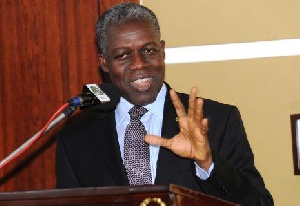Vice President Kwesi Amissah-Arthur on Wednesday commended the Kofi Annan International Peace Keeping Centre (KAIPTC) for complementing the effort of government by providing education in peace and security.
He said work at the Centre in terms of teaching and research continued to impact positively on the society and the government. Vice President Amissah-Arthur was speaking at the joint graduation ceremony for the third batch of students of Master of Arts in Conflict, Peace and Security (MCPS) and the second batch of students for the Master of Arts in Gender, Peace and Security (MGPS) at the KAIPTC at Teshie.
The Centre, apart from the two masters’ degree programmes, would be starting a certificate course in Gender, Peace and Security and doctoral programme in International Conflict Management.
The new graduates, made up of 26 females and 39 males, are from Ghana, Nigeria, Cote D’ Ivoire, Benin, Liberia, Ethiopia, South Sudan and Japan. The Vice President said activities of the centre were increasingly becoming a global reference point for research and training in conflict prevention and peace building.
He said West Africa was facing challenges by people who, through the force of arms and various acts of terror, are seeking to impose their worldview on others.
Vice President Amissah-Arthur said in the last quarter of the century the sub-region had experienced extraordinary wars and conflicts and added “we are therefore committed to resolving our problems without resorting to warfare.” “Our societies have begun a long process of recovery and have started to enjoy a peace dividend because we are determined to accommodate all people whether they practice different religions, or have different cultures and customs,” he said.
He said there was, therefore, the need for technical expertise at the centre to develop strategies for defeating such attempts. The Vice President said 2015 promised to be a challenging one for West African democracy as national elections are scheduled in Nigeria, Togo, Burkina Faso, Guinea and Cote d’Ivoire.
He said electoral disputes had been a major source of instability as certain people sought to profit from any misunderstanding and stressed the need for people to guard against the exploitation of differences and disputes. “West Africa must not revert to the conditions of war and conflict,” he said.
Miss Kanako Ishiyama from Japan was adjudged the overall best student in Master of Arts in Conflict, Peace and Security and Mrs Ugonna Ukaigwe of Nigeria was adjudged the overall best in Master of Arts in Gender, Peace and Security.
Regional News of Thursday, 24 July 2014
Source: GNA
Veep commends Kofi Annan Centre
Entertainment
















